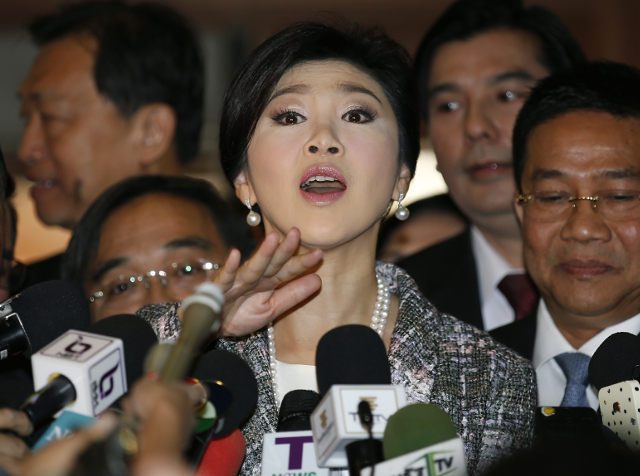SUMMARY
This is AI generated summarization, which may have errors. For context, always refer to the full article.

BANGKOK, Thailand (2nd UPDATE) – Ousted Thai premier Yingluck Shinawatra Thursday, January 22, attacked impeachment proceedings against her ahead of a crunch vote that could see her banned from politics for five years and deepen the country’s bitter divide.
Yingluck, the kingdom’s first female premier and the sister of former leader Thaksin Shinawatra, was toppled from office by a controversial court ruling shortly before the army staged a coup in May.
She faces impeachment Friday by the junta-picked National Legislative Assembly over her administration’s populist rice subsidy program, which funnelled cash to her rural base but cost billions of dollars and inspired protests that felled her government.
Yingluck arrived at heavily policed Parliament House in central Bangkok accompanied by a handful of her party members.
“There is no position to remove me from as the Constitutional Court has already removed me as prime minister,” she told assembly members, also saying she should not be impeached for violating a constitution that no longer exists under junta rule.
Yingluck robustly defended the rice scheme as an attempt to support Thailand’s rural poor, who historically receive a disproportionately small slice of government cash.
“I am not corrupt, I was never careless,” she said, rejecting accusations that had been levelled against her and urging members to consider her case with fairness and “without being guided by anyone”.
But a junta spokesman rejected Yingluck’s allegation that the impeachment process had no basis in law.
“The process is legal and appropriate so that the country can move forward because it will stop conflicts and allow the facts to be seen by the people,” deputy government spokesman Sunsern Kaewkumnerd said.
A successful impeachment needs three-fifths of the 220-strong assembly to vote in favour when they meet on Friday.
A guilty verdict would bring an automatic five-year ban from politics and risks enraging her family’s ‘Red Shirt’ supporters, who have laid low since the coup.
‘Red Shirt’ leader urges caution
Speaking before the hearing Thursday, Jatuporn Prompan, chairman of the Red Shirts, cautioned against street protests on his television show, after noting signs he believed would “lead to impeachment”.
“From tomorrow, we will see more clearly… If we are not patient, Red Shirts will be accused of being responsible for bad things,” he said on Peace TV.
“It is not over on the 23rd, tomorrow is not the end. Time will tell… We have to be patient,” Jatuporn urged his viewers.
Experts say the impeachment move is the latest attempt by Thailand’s royalist elite and its army backers to nullify the political influence of the Shinawatras, whose parties have won every election since 2001.
Thailand’s National Anti-Corruption Commission (NACC) has led the probe into the rice programme, which paid farmers up to twice the market rate for their grain but left Thailand with a mountain of unsold rice.
At the hearing on Thursday, NACC commissioner Vicha Mahakhun described it as a populist policy “used to win the election”.
“NACC members can see she (Yingluck) is guilty of failing to use her power as Prime Minister to stop the project,” which he deemed as causing “huge damage” to the economy and rice farmers.
Prosecutors are also in the process of deciding whether Yingluck should face a separate criminal case over the rice subsidy scheme.
Since Thaksin swept to power in 2001, Shinawatra governments have been floored by two coups and the removal of three other premiers by the kingdom’s interventionist courts.
The Shinawatras’ rise has coincided with the declining health of Thailand’s revered 87-year-old King Bhumibol Adulyadej.
Observers say the febrile politics of recent years, characterised by bouts of street protest and violence, is fired by the concerns of competing elites over the future of the kingdom once the king’s reign ends.
Thaksin, who was deposed as premier in a 2006 coup, is reviled by the Bangkok-based establishment, its supporters in the south and among the judiciary and army, but still pulls on the loyalty of the north and sections of the urban middle and working classes.
Less than a dozen Yingluck supporters had gathered outside parliament in support of the former premier.
“We are now under martial law so people don’t dare to come out in big numbers otherwise soldiers might take them,” said Prapai Khammun, 75, from neighboring Samut Prakan province.
“She has done nothing wrong. She helped rice farmers to have better lives.”
Political gatherings of more than five people are currently banned under martial law. – Rappler.com
Add a comment
How does this make you feel?
There are no comments yet. Add your comment to start the conversation.